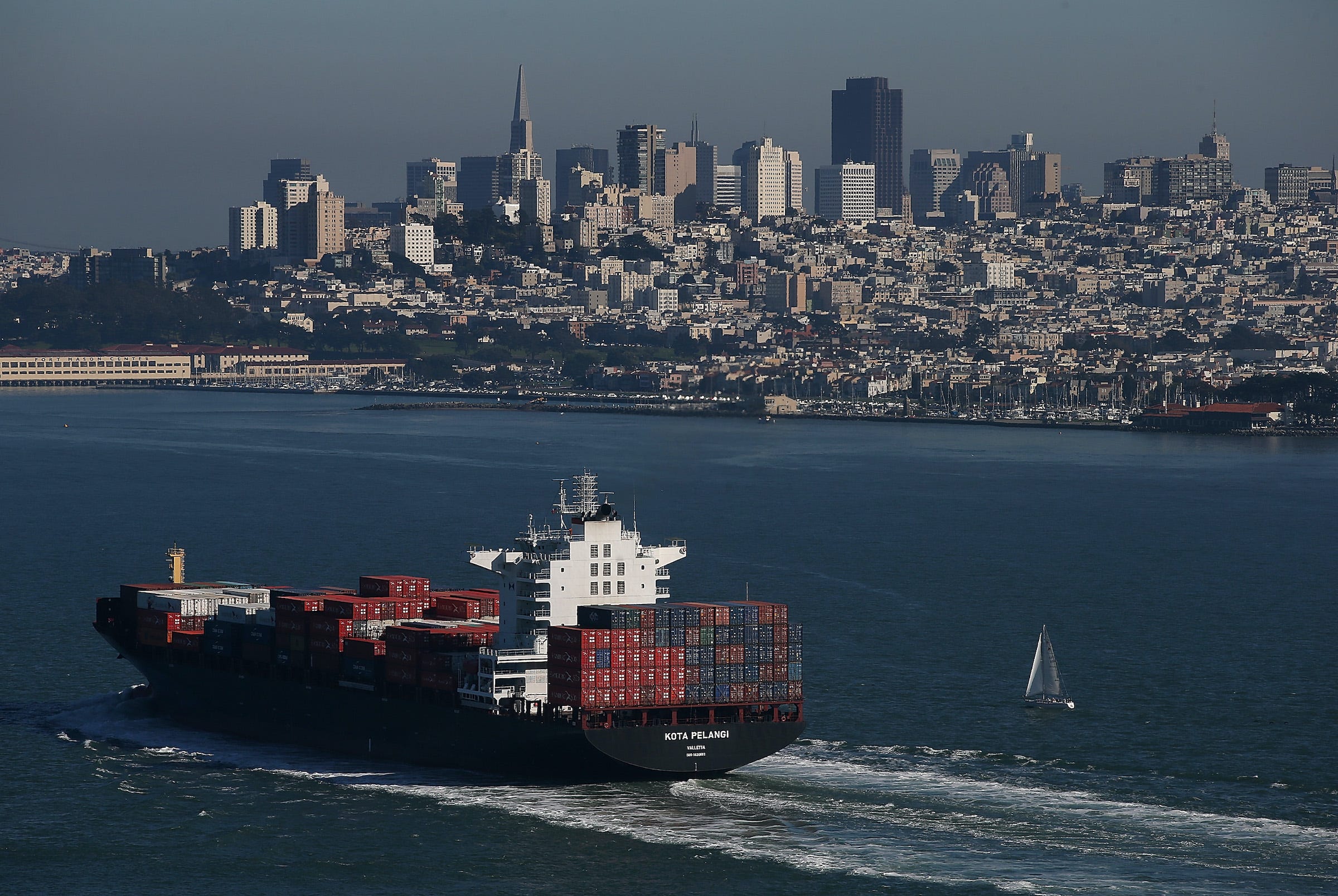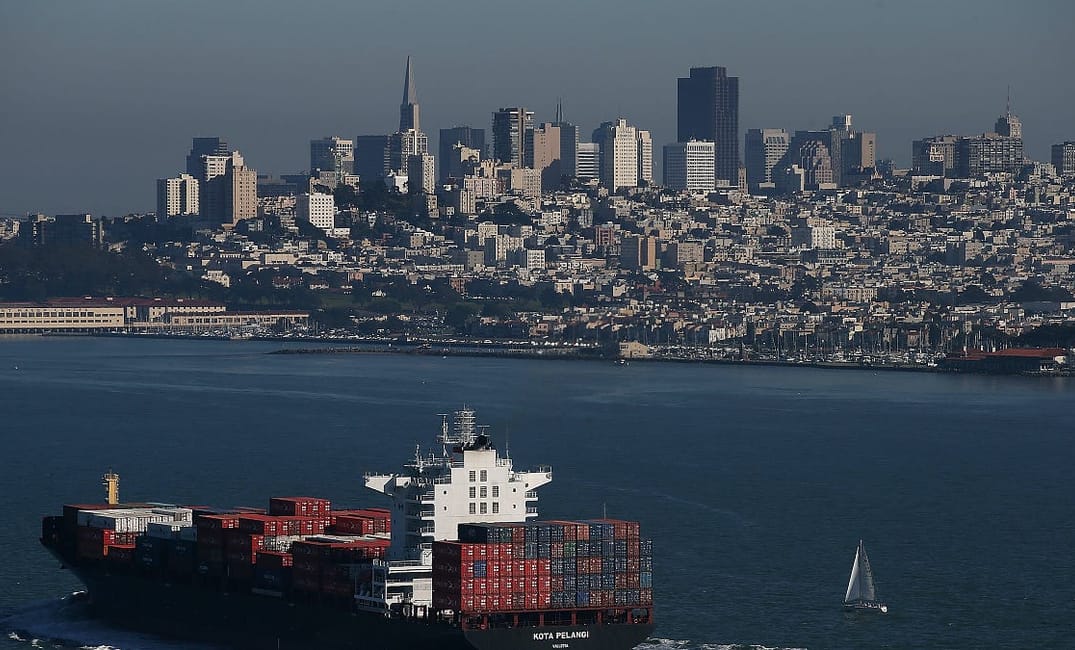
As I saunter into the longshoreman’s union hall, foghorns blast through San Francisco’s early morning overcast sky. I try to blend in and appear as if I do this every day. By “this,” I mean prepare to work the docks, unloading and loading cargo along the city’s coastline.
But there’s no use. I’m a woman working in this place. Not just on this particular day, but the only one to ever work here.
I try to ignore the silence that cuts through the room after I enter, followed by a few loud guffaws and an even louder patter of voices. All these men are speculating out loud about the broad challenging their stronghold on this line of work.
It’s the mid-’70s. I’m 35 years old, arriving with the promise of a good-paying job. I notice a few cigarette-scarred wooden tables that offer a place for the men to gather and talk while waiting to be called to work. Billowing clouds of cigarette smoke hang ominously over everyone.
Sign up for The Bold Italic newsletter to get the best of the Bay Area in your inbox every week.
I amble over to a table set off in a corner and glance through some back issues of Psychology Today and McCall’s, surprised to see more female-oriented publications in this male-dominated place. I’m also grateful for the diversion, a way to avoid the curious and mostly hostile eyes.
At first, it had seemed like a good idea when my friend’s husband — a 20-year waterfront veteran whose father had also worked there all his life — had urged me to take the job. “Look,” he said. “It’s time for women to bust into the docks. You can make at least $80 a day and be the first woman to work on the SF docks.”
Sure, challenging gender roles was interesting, but that wasn’t my main motivation. It was the money that convinced me; it was a sizable sum at that time, especially as a single parent trying to support my teenage son and myself while I went to college. The escapade also held the promise of adventure: All those romantic waterfront characters cascaded through my mind, not least of whom was Marlon Brando. Plus, I knew that the area attracted artists and intellectuals, as well as those who were just barely making it — some from skid row.
Curious about this male bastion, I wondered if it were possible for a woman to be accepted there. Women were rare in that world, even in clerical positions. But I also wanted to know more about the culture, the interface between land and sea, a switching yard from all over the world where goods were transferred, labeled, transported, and disposed of.
Why should men have a stranglehold on that sphere?
Temporarily on semester break from my graduate program at San Francisco State, and working part-time in an office, I had nothing to lose and much to gain. My friend’s husband paved the way by calling the dispatcher and asking him to watch out for me. He used whatever influence he had to increase the possibility that I would be called after the regular day laborers had been taken care of.
And I did get sent out to a nearby wharf that first day. Hired as a clerk, my job was to oversee the movement of the containers on my list and keep track of where they were placed for unloading. That first day was relatively uneventful, and it seemed like an easy way to earn $80. Being the only woman in a sea of men was not new to me. I had signed up for a drafting class in high school where I was the only girl. I loved being the only female, but I also loved the class content.
“These guys are pissed to see a woman bossing them around. If you continue to stand where you are, you won’t have any legs to walk on.”
At 7 a.m. the next morning, I appeared again in the union hall. This time my presence didn’t create as much of a stir. I posted myself once more at the out-of-the-way table, glancing through magazines until my name was finally called along with two younger Black men, also university students. The dispatcher handed the three of us instructions on where to go (a wharf some distance away), and we took a bus to get there. We chatted about school and waterfront work, this also being their first time there.
At the wharf, the boss told us to board a massive cargo ship to view the hundreds of cars that we would be guiding into parking spaces on land. The ship had numerous levels, and we raced from one to the other, amazed at how many vehicles were stored there. Finally, we returned to shore and were instructed to show the longshoremen where to park the cars.
I stood in front of a space, indicating with my arms that the driver should come forward to where I was standing. A bearded longshoreman sauntered over to me and said, “Hey, lady, do you want to get your legs broken?”
I didn’t plan to leave the wharf with broken legs, and I told him that, trying to make a joke. But his icy look silenced me. He wasn’t interested in banter. He said, “These guys are pissed to see a woman bossing them around. If you continue to stand where you are, you won’t have any legs to walk on. Stand to the side like this.” And he showed me where to position myself.
My two days on the waterfront were a time when I experienced directly and vividly the reaction some men have toward women in a world that they still dominate.
I followed his instructions and somehow got through the day intact. But I had heard enough. I quit.
Though I consider myself a feminist, I didn’t burn with a desire to integrate the waterfront. Nor did I need to make a statement by having my legs broken. I just wanted to make enough money to support my son and myself as I worked my way through college. These men, however, didn’t know my intentions. They just saw me as a threat, someone who would alter their domain and change the balance of power.
When I left that day, I wondered if my friend’s husband had been aware of the danger I’d face in that environment. Or had he, unconsciously, used me for his own purposes? Was he genuinely interested in integrating the waterfront? Or was he just trying to test his own power within his work world? Though I’m speculating here, if the latter were true, he had abused our friendship and put me in great peril. After working at the docks for so long, he must have known what the men’s reaction to me would be. If the former were true, had I made any dent in the male prejudice against women in that line of work? I doubt it.
So my two days on the waterfront were just that: a time when I experienced directly and vividly the reaction some men have toward women in a world that they still dominate. Even today, when we see more and more women in positions of power, they continue to suffer from prejudice. I, too, had grown up assuming that men were the fairer and better sex. Certainly, they seemed to hold all the cards. But I also went through the consciousness-raising period of the ’60s and came out of that time with a very different view of womanhood and myself. It no longer amazed me to experience female pilots or TV/radio announcers or doctors or executives. And I even ended up becoming a college professor, something I never would have expected in my younger days.
While my experience of working on the waterfront was brief and may not have changed the dockworkers’ lives, it did change mine. For the first time, I felt directly the physical threat that so many women face, globally, every day. I had taken my gender and myself for granted, floating through life on a cloud of good will. And while I knew that women continued to be the second sex in numerous areas despite their advances, I had never expected to face such bald hostility just because I happened to be female.
Was I a “feminist” at that time? I dislike labels that delimit rather than expand our identities. Yet I was passionate about social justice. I believed then, and I do now, that women should have every opportunity that men have (and vice versa). In the mid-’70s, other women felt similarly. Several were eager to leave the professional world, and whatever gains they’d made there, to learn carpentry, plumbing, and other blue-collar skills. They were ready to make their presence felt in places that previously had been male strongholds.
Becoming a manual worker wasn’t my goal when I looked for work at the docks. I had a son to raise, rent to pay, and a degree to earn. But I was part of the zeitgeist, and I’m sure some of these women’s desires to try their hands (literally in some cases) as artisans were circulating in the media as well as by word of mouth, penetrating my world as well. I don’t know how many women now are employed on American docks, but I’m sure they are there. I hope they aren’t being threatened as I was. We’ve come too far to return to the status quo, though we still have some distance to go before we can claim full equality.







